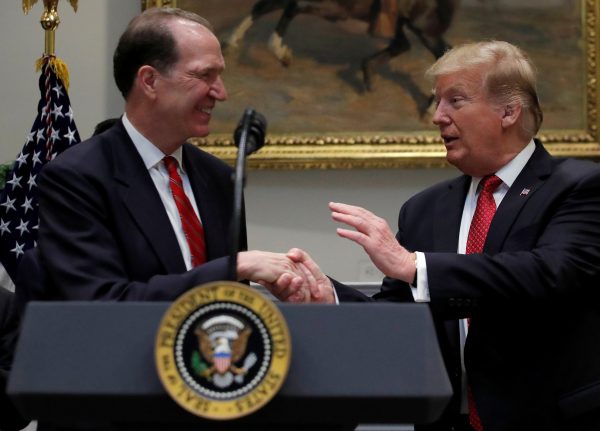Now that he has US backing, the chances are that he will quickly get the job. In principle, the Board of Executive Directors of the World Bank is committed to an internationally competitive selection process. As soon as Jim Kim announced his resignation, the board issued a list of Selection Principles proposing five key criteria to be considered. The list, which was a good one, includes having a proven track record of leadership, the ability to articulate a clear vision for the World Bank’s development mission and an appreciation for multilateral cooperation.
It’s a good try. But the board’s effort will almost certainly fail. The United States has come to regard the World Bank post as a gift from the US president. The Trump administration doubtless expects that the board will confirm Malpass as World Bank president without too much fuss.
Malpass has a solid Republican background. He worked in the Reagan and HW Bush administrations, had a career on Wall Street working for the Bear Stearns global investment bank before it collapsed in 2008, and ran (unsuccessfully) in a Republican primary in New York for the US Senate in 2010.
More recently he worked as an economic adviser to Trump during the 2016 presidential election campaign and was appointed as undersecretary for international affairs at the US Treasury Department in 2017.
Since joining the Treasury Department, Malpass has been an outspoken sceptic of both multilateralism and, more specifically, of the World Bank’s activities. In an extended interview in 2017 he outlined the Trump administration’s view that ‘multilateralism has gone substantially too far’. One of the problems of the multilateral system, he said, is that it ‘often drifts away from our values of limited government, freedom, and the rule of law’.
Malpass was also critical of the World Bank’s program of lending to China. He said that it ‘doesn’t make sense’ for China to receive money borrowed in the United States, using the US government guarantee, when Beijing has ‘plenty of resources’ of its own and access to capital markets.
Views of this sort reflect boilerplate Republican approaches to international agencies such as the World Bank. They will nevertheless dismay staff of the World Bank, many of whom were bewildered by the nature of Jim Kim’s abrupt departure.
It may be that not too much should be made of Malpass’ tough language. Senior US Treasury officials — Republican and Democrat alike — have a long track record of growling at the World Bank and pounding the table during international negotiations over funding. They need to demonstrate to their colleagues around Washington and especially to Congress that they are protecting US foreign policy interests.
Neither are their criticisms always unreasonable. It is certainly true that the World Bank and numerous other international agencies have fat that can be trimmed. It is also true that many of these agencies are subject to ‘mission creep’ and that close reviews of their work programs are often useful.
If and when Malpass takes up the post as president of the World Bank, he will find himself in charge of a sprawling bureaucracy that contains many internal fiefdoms. He will face much resistance to change, both from within the World Bank and from many of the 189 member countries that belong to it — including, no doubt, China.
Hopefully Malpass will balance scepticism with enthusiasm as president. His faith in US benevolence should help bolster him in his work. In the same 2017 interview, he explained that it is in the United States’ ‘own self-interest’ as a global leader to see neighbours do well.
If he can apply principles of this kind to his new job, Malpass might come to leave his mark as one of the more successful presidents of the World Bank.
Peter McCawley is Honorary Associate Professor in the Crawford School at the Australian National University. He is formerly an Australian Executive Director on the Board of the Asian Development Bank in Manila.


Paul Krugman just wrote a piece for the NYT in which he reviews Malpass’ record. It is not complimentary, to say the least. It should be noted that Krugman is an outspoken critic of Trump in most every respect. But it is worth reading.